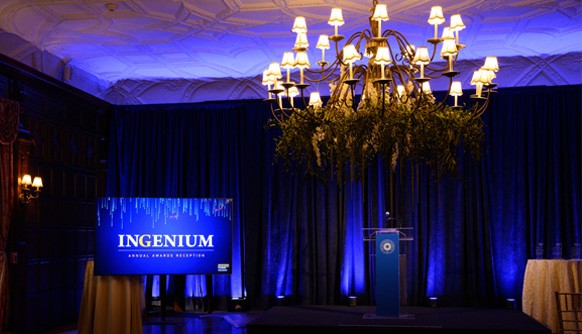News
In Honor of Earth Day
April 22, 2021
Each year, April 22 marks the anniversary of the modern environmental movement: Earth Day.
The first Earth Day, held in 1970, brought attention to the state of the planet. Since the event’s early beginnings, colleges and universities have been central figures of the environmental movement. The event originally began with teach-ins at higher education institutions, which were intended to educate people about the impact of human practices on the environment.
New York Tech innovators, makers, and doers are continuously working to solve some of the planet’s most pressing issues, including sustainable design and limited resources, among others.
In recognition of Earth Day 2021, here are several of the green initiatives taken by faculty and students, as recently featured on The Box.
“Granting” Resource Management
New York Tech has received impressive research grants to study the protection of the Earth’s fragile resources. In February, the New York State Energy Research and Development Authority (NYSERDA) awarded a $250,000 grant to Willdan Group in partnership with New York Tech. The grant will help support the university’s efforts to develop research and training opportunities in the area of energy efficiency. The activities at New York Tech will be led by Ehsan Kamel, Ph.D., assistant professor at NYIT College of Engineering and Computing Sciences, in collaboration with Amy Bravo, M.A., senior director of experiential education. New York Tech faculty and students will partner with the Willdan Group to enable researchers, students, and other organizations to find solutions to improve buildings’ energy efficiency and provide training for the future workforce in this field. Read the full story.
New York Tech also received a $747,000 grant in 2019 from the U.S. National Science Foundation to establish a research coordination network that will study various aspects of the food, energy, and water (FEW) nexus for sustainable and resilient urban development. The project, led by Ziqian (Cecilia) Dong, Ph.D., associate professor of electrical and computer engineering, will allow researchers at New York Tech and other prestigious universities and organizations to collaborate on this pressing topic. Using a “city-as-lab” model, the ongoing project explores an in-depth study of New York City and Phoenix, Ariz. Read the full story.
Designing a More Sustainable Future
NYIT School of Architecture and Design students are envisioning greener public spaces. Four of the school’s students were recently named to Metropolis magazine’s Future100 list, which recognizes North America’s top 100 architecture and interior design talents who have worked on workplace, hospitality, healthcare, retail, residential, and outdoor projects or completed research projects in sustainability, inclusivity, and technology. New York Tech students named include two students from the Architecture, B. Arch. program, Ariel Lorenzi and Jacqueline Pileggi, as well as Nicole Wolert, an undergraduate in the Interior Design, B.F.A. program, and Architecture, M. Arch. student Aleksandra Zatorksa. Read the full story.
Architecture undergraduate Nicholas Spano is also one of the school’s many students working on impactful environmental design projects. When Spano’s class was given a studio assignment to re-envision Westchester Creek in the Bronx, N.Y., he came up with the Environmental Education Center and Butterfly Sanctuary. His project aims to allow native species to reclaim the land by promoting biodiversity while simultaneously educating the public. Read the full story.
Climate Change, Diet, and Disease
In honor of National Nutrition Month in March, Lorraine Mongiello, DRPH, RDN, CDE, associate professor of interdisciplinary health sciences, delivered a trio of hard-hitting conference presentations to encourage nutritionists to keep environmental questions at the center of their professional practice. “The Dietary Triple Threat: COVID, Climate, and Chronic Disease,” tied the current pandemic to environmental conditions and lifestyle choices that humans can influence, individually and collectively, to make the world safer and healthier. Passionate about the connection between the state of the planet and human health, she advises patients to make everyday choices that simultaneously benefit their own health and the health of the environment. Read the full story.
Forest Therapy Walks
The new series, introduced by the Office of Real Estate Development and Sustainable Capital Planning in January 2021, provides the Long Island campus community with a new way to access the serene and restorative environment. Led by Certified Forest Therapist Linda Lombardo, the two-hour strolls cover 1.5 miles through the woodland forests on campus, with Lombardo pointing out various species of plants and other highlights along the way.
“This campus has so much natural beauty to offer our students and employees,” says Suzanne Musho, New York Tech vice president for real estate development and sustainable capital planning and chief architect. “The university is re-affirming our commitment to ecology. The forest therapy walks through our woodlands provide the much-needed respite for our students, faculty, and staff and provide a campus experience like no other. Forest therapy is an amazing way to reconnect to nature and relieve the stress that occurs in everyday life, particularly now.” Read the full story.
Caring for the Commons
How can consumers be encouraged to take better care of public goods and resources? That’s the question posed in a fall 2020 research paper co-authored by Colleen P. Kirk, D.P.S., associate professor of marketing, in the Journal of Marketing. The study aimed to help solve the “tragedy of the commons,” the idea that when goods or resources are shared by many owners, they are subject to abuse or neglect. The tragedy can be seen in many public spaces, such as parks, fishing areas, and beaches, and has contributed to several environmental challenges, including ocean pollution. Kirk joined researchers from Wisconsin–Madison School of Business, the University of Iowa, and Cornell University in exploring how increased feelings of ownership towards a public good can help ensure that individuals do their part. Read the full story.



_Thumb.jpg)

